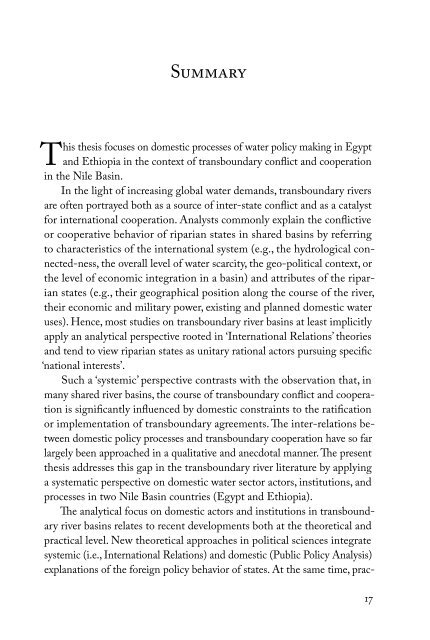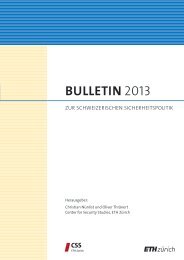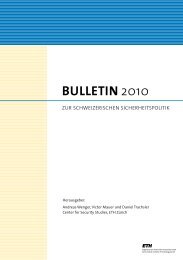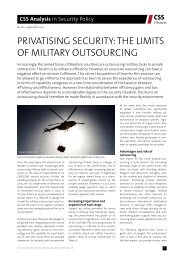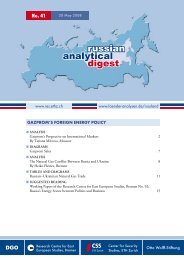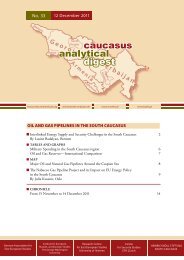Double-Edged Hydropolitics on the Nile - Center for Security Studies ...
Double-Edged Hydropolitics on the Nile - Center for Security Studies ...
Double-Edged Hydropolitics on the Nile - Center for Security Studies ...
You also want an ePaper? Increase the reach of your titles
YUMPU automatically turns print PDFs into web optimized ePapers that Google loves.
Summary<br />
T<br />
his <strong>the</strong>sis focuses <strong>on</strong> domestic processes of water policy making in Egypt<br />
and Ethiopia in <strong>the</strong> c<strong>on</strong>text of transboundary c<strong>on</strong>flict and cooperati<strong>on</strong><br />
in <strong>the</strong> <strong>Nile</strong> Basin.<br />
In <strong>the</strong> light of increasing global water demands, transboundary rivers<br />
are often portrayed both as a source of inter-state c<strong>on</strong>flict and as a catalyst<br />
<strong>for</strong> internati<strong>on</strong>al cooperati<strong>on</strong>. Analysts comm<strong>on</strong>ly explain <strong>the</strong> c<strong>on</strong>flictive<br />
or cooperative behavior of riparian states in shared basins by referring<br />
to characteristics of <strong>the</strong> internati<strong>on</strong>al system (e.g., <strong>the</strong> hydrological c<strong>on</strong>nected-ness,<br />
<strong>the</strong> overall level of water scarcity, <strong>the</strong> geo-political c<strong>on</strong>text, or<br />
<strong>the</strong> level of ec<strong>on</strong>omic integrati<strong>on</strong> in a basin) and attributes of <strong>the</strong> riparian<br />
states (e.g., <strong>the</strong>ir geographical positi<strong>on</strong> al<strong>on</strong>g <strong>the</strong> course of <strong>the</strong> river,<br />
<strong>the</strong>ir ec<strong>on</strong>omic and military power, existing and planned domestic water<br />
uses). Hence, most studies <strong>on</strong> transboundary river basins at least implicitly<br />
apply an analytical perspective rooted in ‘Internati<strong>on</strong>al Relati<strong>on</strong>s’ <strong>the</strong>ories<br />
and tend to view riparian states as unitary rati<strong>on</strong>al actors pursuing specific<br />
‘nati<strong>on</strong>al interests’.<br />
Such a ‘systemic’ perspective c<strong>on</strong>trasts with <strong>the</strong> observati<strong>on</strong> that, in<br />
many shared river basins, <strong>the</strong> course of transboundary c<strong>on</strong>flict and cooperati<strong>on</strong><br />
is significantly influenced by domestic c<strong>on</strong>straints to <strong>the</strong> ratificati<strong>on</strong><br />
or implementati<strong>on</strong> of transboundary agreements. The inter-relati<strong>on</strong>s between<br />
domestic policy processes and transboundary cooperati<strong>on</strong> have so far<br />
largely been approached in a qualitative and anecdotal manner. The present<br />
<strong>the</strong>sis addresses this gap in <strong>the</strong> transboundary river literature by applying<br />
a systematic perspective <strong>on</strong> domestic water sector actors, instituti<strong>on</strong>s, and<br />
processes in two <strong>Nile</strong> Basin countries (Egypt and Ethiopia).<br />
The analytical focus <strong>on</strong> domestic actors and instituti<strong>on</strong>s in transboundary<br />
river basins relates to recent developments both at <strong>the</strong> <strong>the</strong>oretical and<br />
practical level. New <strong>the</strong>oretical approaches in political sciences integrate<br />
systemic (i.e., Internati<strong>on</strong>al Relati<strong>on</strong>s) and domestic (Public Policy Analysis)<br />
explanati<strong>on</strong>s of <strong>the</strong> <strong>for</strong>eign policy behavior of states. At <strong>the</strong> same time, prac-<br />
17


